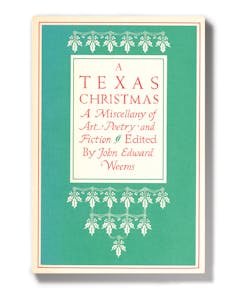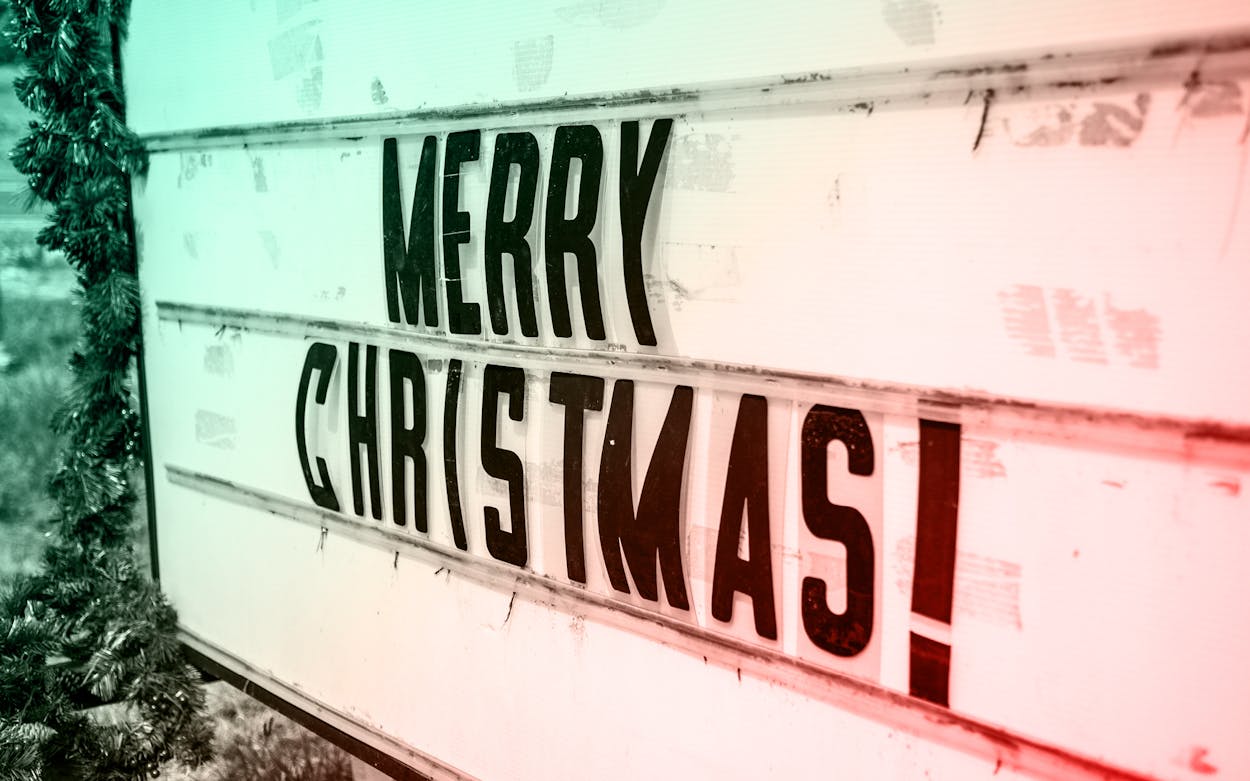
Perhaps it is not surprising then that I became a writer for a living. By my best guess, I have put more than 5 million words on paper during my career. That hasn’t dulled my enthusiasm for books in the slightest, and some of my most beloved publications are now out of print. This week, one such book came into my possession, A Texas Christmas: A Miscellany of Art, Poetry, and Fiction, edited by John Edward Weems.
The writers that fill this anthology were from old Texas. By that I mean they grew up in rural parts of the state on farms and ranches during the first half of the twentieth century. They wrote about their attachment to the land and the animals they raised for food. And they spoke to readers like themselves, people who knew what it meant when friends and family shouted “Christmas gift!” during the holiday season.
I’m such a city slicker—a cosmic cowboy who is all hat and no cattle—that I had never before heard the phrase, and it sent me on a search for its meaning. Turns out that it was a common saying in the South beginning around 1844, but it has largely faded away. The specific use of the term is reserved for Christmas morning. The first person to shout it out is supposed to receive a gift from everyone else—in the broader sense, this was the early Texas version of “Merry Christmas”—but the phrase “Christmas gift!” was mostly intended to express the idea that Christ is the gift of the season.
The book is about Texas, not religion, but this is just one example of what you can learn in a collection of wonderful writing. In that spirit, I couldn’t resist sharing some excerpts in the hope that you’ll be prompted to find a copy for yourself. Weems brought together some of the best writers of his generation, telling them he was putting together a Christmas book and that they could write whatever they wanted. Here’s a taste of what they produced:
A.C. Greene recalled the Christmas in Abilene when his grandmother took a Saturday off from working at the library to take him shopping for presents: “She had to be away from her job, and she got a day’s pay deducted, too. This was during the Great Depression, so giving up day’s pay was a serious and substantial matter.” The story centers on a trolley ride and going shopping at Minter’s Dry Goods on a day that concluded with a snowfall. “Just the lightest kind of downy flake, but a real snow for West Texas at Christmas time. A rare miracle that made the day perfect.”
Leon Hale reflected upon looking out into the darkened Gulf of Mexico at Christmas time and seeing a single bright star: “I think of the square miles of Christmas lights burning now in Houston, spinning the meters of the power company. Their beauty is nothing, compared to this natural star in the east. Well, actually, it’s a planet but never mind that. I prefer to call it a star.” Sometime around 1988, I once shared a meal of alligator tail with Leon at a restaurant in New Orleans. He’s about 96 these days, and I’m happy to say he’s still around to gaze at stars—or planets that he calls stars.
Lastly, here’s Stanley Marcus, who for years ran the Neiman Marcus department store: “I was a firm believer in the concept of multiple gifts round a theme that heightened the adrenalin flow of the recipient as she opened many packages all related to each other.”
But gifts needed to be practical as well as magical, he wrote. He once received a pair of Mongolian geese, and another year a jackass. Both were an impractical source of aggravation. He actually ate the geese.
Now, you’ll recall that I once worked at an upscale bookstore in Dallas. Stanley Marcus’s mother was, like me, a lover of books. One time, she carted off armloads from that bookstore, mostly to give away as gifts. What she didn’t like was paying the bill. Once a month, Stanley Marcus came by to pay his mother’s tab. So it was particularly interesting that in his story, Marcus says the best gift he ever received was a small collector’s book containing a single crayon drawing by a French master.
While you may not be able to afford expensive gifts like Stanley Marcus, please remember his advice as you head out in search of Black Friday deals: “As I approach every holiday season I recall the incident and become renewed in my inspiration to make my gifts carry the qualities of surprise, utility, drama, and fulfillment. When successful, these gifts reward the giver as well as the recipient; no place offers a better starting point to begin the Christmas search than a good bookstore.”






